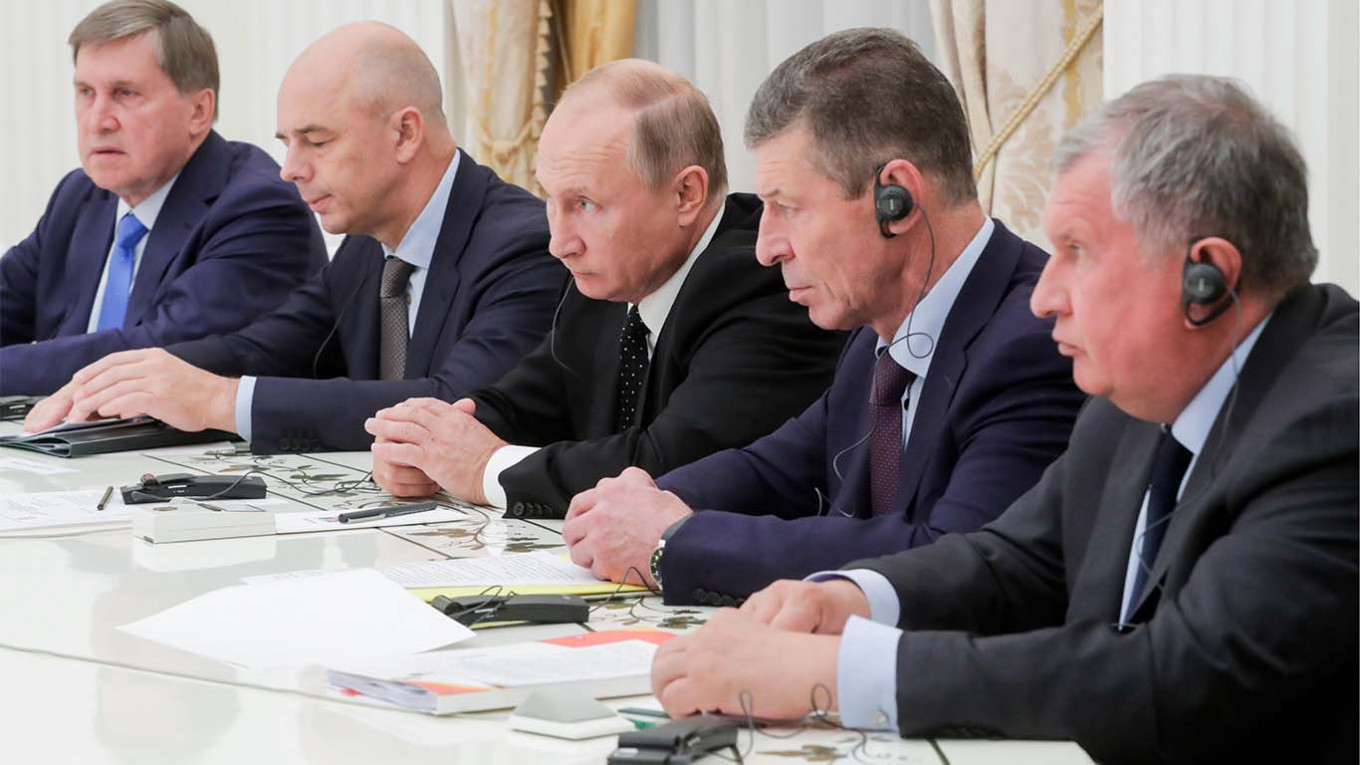Perhaps the key question about the July 1 nationwide vote on changing the Russian constitution is why President Vladimir Putin needed it at all.
Generally, the explanation is that he needs to legitimize his new constitution — which will allow him to remain in power after his current term ends in 2024 — and renew the social contract.
These are reasonable deductions, but they fail to take into account another important factor: how the vote will affect Putin’s relationship with the elite.
The much-vaunted “Putin majority” has long been not so much a pillar of Putin’s rule as an argument he can use in his debates with his own circle. The vote is an attempt to obtain a certificate of public trust that Putin can thrust in the faces of the elites, who are the real source of his worries.
Recently, the president said that unless the clock was reset on presidential terms in this vote, allowing him to run again in 2024, “in a couple of years, as I know from experience, instead of a normal work routine, people at many levels of authority will start looking around in search of possible successors.”
This fear that the elites will start searching for a successor instead of working as usual explains Putin’s desire to reconfigure his relationship with them. His plan to get the people’s seal of approval betrays his growing distrust of the establishment.
Any ruler builds their power either on a contract with the people, which allows them to impose their decisions on the elite, or on a contract with the elite, which helps them to get the people in line.
Putin rode to power in 2000 on the back of the “Putin majority” that enabled him to purge and neutralize the Yeltsin elite: the oligarchs and regional governors. Back then, the elites were a potential (and sometimes actual) opponent and source of destabilization. Then Putin’s growing team developed its own ambitions. Now it’s both a substantial and yet fragmented entity that has learned how to rule.
The state agenda and that of Putin’s oligarchs are not always the same.
Take Rosneft CEO Igor Sechin, who was allegedly behind Russia’s recent withdrawal from the deal with OPEC, having previously landed Putin’s economic development minister, Alexei Ulyukayev, in jail. Meanwhile, the liberal faction wants to normalize relations with the West, while the siloviki do as they like, with little thought for the Kremlin: look at the number of criminal prosecutions that have divided the elites, such as the cases against the U.S. investor Michael Calvey, theater director Kirill Serebrennikov, and journalist Ivan Golunov.
The Putin oligarchy is becoming increasingly autonomous.
Tycoons like Sechin, Arkady Rotenberg, and Yury Kovalchuk have been close to Putin since he first came to power.
In the early 2000s, they accumulated assets in Putin’s name. Now those resources enable them to operate in their own names, which represent gigantic conglomerates with major financial and political influence.
As a powerful, ambitious, and dominant part of the Russian establishment, the Putin oligarchy inevitably has to consider scenarios for Russia’s development both under Putin, and after he is gone — especially since the president shows less and less interest in the country’s day-to-day running.
This detachment has also increased concerns over the squabbling behind his back: an inevitable source of growing distrust.
Upon beginning his fourth term in 2018 — which should have been his final one under the previous constitution — Putin lasted less than two years as a lame duck before taking action to change his situation by amending the constitution.
His attempt to renew his mandate now is a challenge to those who surround him and a rejection of the changing reality. Essentially, he is banning his associates from looking around for a successor and from discussing their own future.
Before March 2020, when the constitutional amendments were announced, there was a timeframe for the transition of power: 2024, when Putin’s current term ends. Now the transition is no longer a question of time. By forbidding discussion of what will come after him, Putin is trying to calm the elites and shelve the problem of the transition. But his decision is having the opposite effect and only increasing uncertainty.
Putin has decided that he needs a renewed mandate from the public to establish a new regime with a new constitution and a presidential monopoly on deciding the future. Formally, he will likely obtain this mandate. The problem is that the president and elites could have differing interpretations of the degree of legitimacy of this mandate, and of the strength of public support for Putin.
Polls show that more than half of Russians are prepared to vote in favor of the constitutional amendments. When administrative resources (such as pressuring state sector employees to vote) are factored in, the result of the vote could be more than 70% in support of the changes. But that 70% may have a different political meaning for Putin and the oligarchs.
The president may consider the outcome of the vote as confirmation that the Russian public is providing him with a guarantee of support for more years to come. But the pragmatic elites will have a far more sober view of things. They know exactly how voting works in Russia, and that same 70% can easily be read as 25% real support, or even as a loss of trust entirely.
The referendum was intended by Putin as a way to renew his political mandate in order to impose decisions on the elite, but its legitimacy is dubious. In his quest to put the clans in their place, Putin is unilaterally drawing new red lines, making the relationship more pragmatic and less of a team effort. Deprived of their claim to the future, the elites will inevitably continue to look around for a successor, just without distracting Putin from his “normal work routine.”
Putin’s general aim in holding the nationwide vote is to cement the state of affairs that followed Russia’s 2014 annexation of Crimea, which sent his approval ratings soaring. In reality, that world has long been eroded. This attempt to remain in a vanishing past scares many, not just among the opposition but also within the establishment, where there is desire to move forward. For now, we are not talking so much of an elite rebellion as of their instinct for self-preservation as they see that old political tools are worn out and can no longer guarantee stability.
This article was first published by the Carnegie Moscow Center.
A Message from The Moscow Times:
Dear readers,
We are facing unprecedented challenges. Russia's Prosecutor General's Office has designated The Moscow Times as an "undesirable" organization, criminalizing our work and putting our staff at risk of prosecution. This follows our earlier unjust labeling as a "foreign agent."
These actions are direct attempts to silence independent journalism in Russia. The authorities claim our work "discredits the decisions of the Russian leadership." We see things differently: we strive to provide accurate, unbiased reporting on Russia.
We, the journalists of The Moscow Times, refuse to be silenced. But to continue our work, we need your help.
Your support, no matter how small, makes a world of difference. If you can, please support us monthly starting from just $2. It's quick to set up, and every contribution makes a significant impact.
By supporting The Moscow Times, you're defending open, independent journalism in the face of repression. Thank you for standing with us.
Remind me later.








